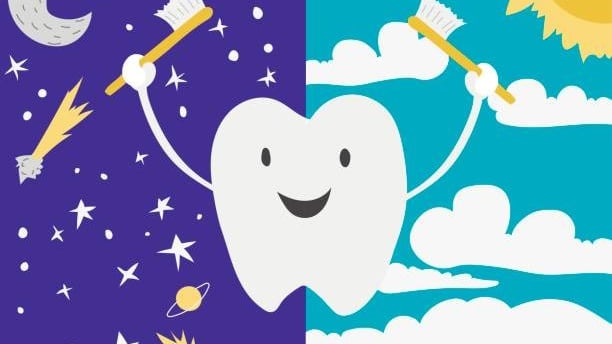Morning vs. Night Dental Routine: Which Matters More for Your Oral Health?
BRIGHT SMILES TIPS
11/11/20244 min read


The Importance of Oral Health
Maintaining good oral health is essential not only for the well-being of the mouth but also for the overall health of an individual. Oral health impacts various bodily functions and can significantly influence one's quality of life. Neglecting dental care can lead to several complications, including gum disease and cavities. Gum disease, caused by the accumulation of plaque and bacteria, can result in inflammation and infection of the gums, potentially leading to tooth loss if left untreated. Moreover, cavities, which are permanent damage to the teeth, can cause pain, infection, and difficulty in eating and speaking.
There is growing evidence suggesting that oral health is closely linked to systemic health issues. For instance, studies have shown a potential connection between gum disease and serious health conditions such as heart disease and diabetes. The inflammation caused by periodontal disease may contribute to the development or worsening of these systemic diseases. People with diabetes also face a higher risk of gum disease, creating a vicious cycle that can be challenging to break. Thus, the prevention of oral health issues is not solely a matter of avoiding dental problems but also crucial for preventing serious health implications.
Regular dental habits, including consistent brushing and flossing, play a vital role in preventing these problems. Engaging in a proper oral dental routine helps to reduce plaque buildup, minimize the risk of cavities, and maintain gum health. By prioritizing oral hygiene, individuals can significantly decrease their chances of facing complicated dental health issues and related systemic conditions. This foundational knowledge sets the stage for a deeper examination of morning versus night dental routines and their respective contributions to maintaining optimal oral health.
Morning Dental Care Routine: Benefits and Best Practices
A consistent morning dental care routine is essential for maintaining optimal oral health. One of the primary benefits of brushing and flossing in the morning is the elimination of plaque buildup that occurs overnight. During sleep, saliva production decreases, allowing bacteria to thrive and form plaque, which can lead to tooth decay and gum disease. By engaging in a thorough oral care routine upon waking, individuals can mitigate these risks, ensuring a fresher breath and cleaner mouth to start the day.
The practice of brushing twice a day, particularly in the morning, not only aids in plaque removal but also significantly contributes to reducing oral bacteria. The timing of brushing is crucial; it is generally recommended to wait about 30 minutes after breakfast before brushing to avoid enamel erosion, especially if acidic foods were consumed. This approach maximizes the effectiveness of the fluoride in toothpaste, which strengthens tooth enamel and further protects against cavities.
In addition to brushing, incorporating flossing into the morning routine is equally important. Flossing removes food particles and plaque from between teeth and along the gum line, areas that a toothbrush may miss. This practice not only contributes to better overall oral hygiene but also helps prevent gum disease, which can lead to more serious health issues if left unaddressed.
Utilizing mouthwash as part of a morning dental care routine can provide further benefits. An antimicrobial mouthwash can help reduce bacteria, ensuring a fresh start to the day. Additionally, making conscious dietary choices—such as avoiding sugary or acidic foods for breakfast—can further enhance oral health. Ultimately, establishing an effective morning dental routine is a pivotal step towards achieving and maintaining strong, healthy teeth and gums.
Night Dental Care Routine: Key Aspects and Impact
Establishing an effective night dental care routine is pivotal for maintaining optimal oral health. After a long day, food particles and plaque accumulate on the teeth, increasing the risk of cavities and gum disease if not adequately removed. A thorough nighttime regimen aids significantly in eliminating these residues, reducing the likelihood of oral health issues.
Brushing your teeth with fluoride toothpaste is a fundamental aspect of this routine. Fluoride plays a crucial role in strengthening tooth enamel and providing a protective barrier against the acids produced by plaque. It is recommended to brush for at least two minutes, ensuring that all surfaces of the teeth—front, back, and chewing surfaces—are reached. This practice not only helps to remove leftover food particles but also contributes to long-term dental health by potentially reversing early signs of decay.
Flossing should also be an integral part of your nighttime dental care. Many individuals overlook this vital step, mistakenly believing that twice-daily brushing suffices. However, flossing effectively removes plaque and debris from between the teeth, where toothbrushes cannot reach. This action significantly decreases the chances of developing interproximal cavities and periodontal disease, allowing your gums to remain healthy and pink.
It is important to avoid common pitfalls in nighttime routines. For instance, brushing too aggressively can lead to enamel wear and gum recession. Additionally, neglecting to brush or floss at night can lead to an increased buildup of plaque overnight, making it harder to maintain oral health. Furthermore, indulging in snacks before bed without proper dental care can introduce sugars and acids that amplify the risks of tooth decay. By adhering closely to a deliberate nighttime dental care routine, individuals can enhance their oral hygiene practices and support overall dental health effectively.
Choosing the Right Routine for You: Morning, Night, or Both?
Establishing an effective dental care routine is crucial for maintaining optimal oral health. Individuals may often find themselves weighing the benefits of a morning versus a night dental routine or even the effectiveness of adhering to both. The ideal approach depends on personal lifestyle, habits, and specific health needs. For instance, morning dental routines often focus on removing any accumulated plaque and bacteria developed overnight, ensuring a fresh start to the day. In contrast, a night routine is equally essential, as it addresses the residues of food and beverage consumption throughout the day.
Customizing one’s dental care routine is imperative. Individuals should evaluate their eating habits, oral hygiene practices, and any existing dental issues. This evaluation can lead to the understanding that some might require more intensive care, particularly at night, due to conditions such as dry mouth or nighttime grinding of teeth. Consulting with a dental professional can provide personalized recommendations based on individual health conditions and oral hygiene practices. A dentist can offer insights into how adjusting the timing and type of routine may benefit specific situations.
The cumulative effects of consistently following a dual dental routine, incorporating both morning and night practices, can have a profound impact on overall oral health. When dental care is performed diligently at both times, individuals may experience fewer cavities, reduced gum disease, and a healthier smile over time. Moreover, incorporating regular dental check-ups into the routine ensures that any issues are identified early. Ultimately, individuals must prioritize their oral health by refining their routine to suit their lifestyle while striving for a balanced approach that encompasses morning, night, or both dental care practices.
